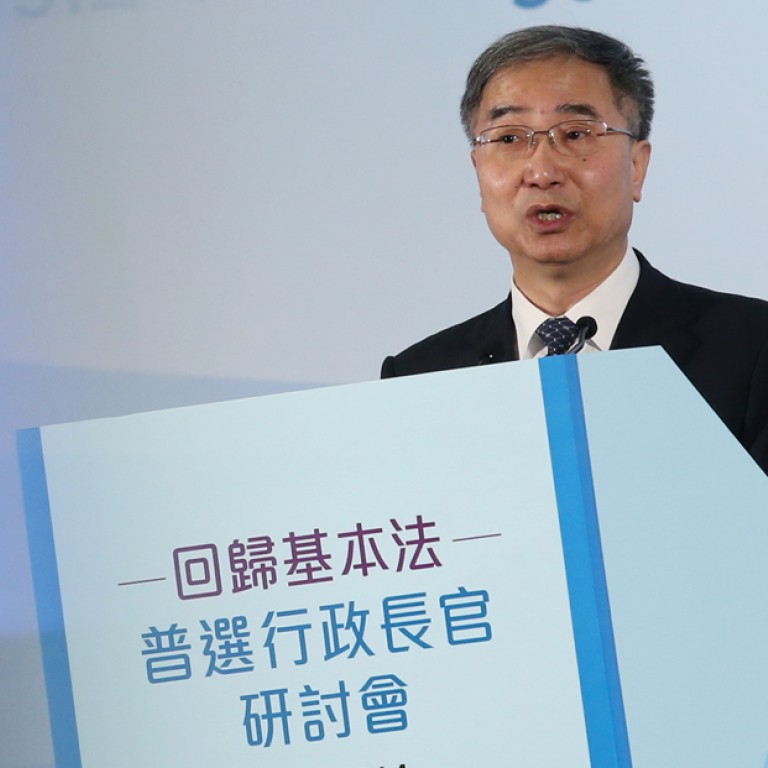
Hong Kong must stand its ground against resurrection of Article 23
Albert Cheng condemns silence of elite after suggestion that we should implement nation's security laws until our own legislation is in place
Basic Law Committee member and law professor at Peking University Rao Geping said at a recent political forum in Hong Kong that the nominating committee is the only body that can select chief executive candidates.
He unequivocally stated that public or political party nomination is out because these proposals attempt to circumvent the nominating committee and hence weaken its power, which would go against the Basic Law.
His remarks undoubtedly delighted Chief Secretary Carrie Lam Cheng Yuet-ngor, who hosted the forum. She immediately said Rao's comments were spot on and set the tone and direction for the political reform debate.
Later, in an interview with a pro-Beijing publication, Rao went even further by saying that some mainland academics wanted the mainland's national security laws applied in Hong Kong until the city enacted Article 23.
If national security laws were applied here, it would send jitters through society
Rao's comments set the stage for an official visit by our lawmakers to Shanghai. To advocate the implementation of the national security laws in Hong Kong is to put pressure on Legislative Council members.
It's obvious that the suggestion contravenes the Basic Law and seriously damages the fundamental principles of "one country, two systems" and "Hong Kong people ruling Hong Kong".
Under Article 8, the laws previously in force in Hong Kong shall be maintained, except for any that contravene the Basic Law, subject to amendment by the legislature.
Further, Article 18 says national laws shall not be applied in Hong Kong except for those listed in Annex III. Those deal with issues such as the national anthem, national flag, and nationality.
The fundamental principles of freedom and the rule of law are irreplaceable, to guarantee our long-term prosperity and stability, which is why Deng Xiaoping created the policies of "one country, two systems" to deal with the transition from the colonial era. Hong Kong's capitalist system and way of life are guaranteed to remain unchanged for 50 years.
But 17 years after the handover, and especially after Leung Chun-ying took over as chief executive two years ago, Hong Kong is no longer what it used to be. The city is on a tight leash controlled by the central government.
Our much-cherished core values are fast eroding and Rao's comments could be likened to rubbing salt into our wounds.
Introducing the mainland's national security laws could open the floodgates, allowing a tighter grip on our freedoms and rights because suspects could be detained indefinitely without evidence or a proper trial, and even found guilty under the pretext of national security.
If national security laws were applied in Hong Kong, it would send jitters through society. Many would emigrate, taking with them large amounts of money, resources and investments, including those backed by the mainland.
Some have claimed that the planned Occupy Central movement would cost the city HK$1.6 billion a day; implementation of national security laws could cost hundreds of billions of dollars.
Those so-called legal academics from the mainland like Rao know very little about today's rule of law, so it's understandable why they came up with such nonsense. But it's sad to see how some of our own people were so eager to parrot what they said.
Legislator Priscilla Leung Mei-fun, who is also a law professor, blindly agreed with Rao, saying Annex III could be modified after the National People's Congress Standing Committee consulted the government and the Basic Law Committee. Once agreed, national security laws could be implemented without being approved by Legco.
It's shameful for her, as a legal professional, to disregard the spirit of the law.
Surprisingly, top barrister and Basic Law expert Alan Hoo urged Hongkongers to back Article 23 if they don't want Beijing to bring in the mainland's national security laws. Maybe Hoo has forgotten the consequences when Tung Chee-hwa tried to push through Article 23 in 2003 - half a million people marched on the streets. It brought an early end to Tung's term as chief executive.
The last governor of Hong Kong, Chris Patten, was right in predicting that Hong Kong would not be sold out or ruined by Beijing, but rather, by some people from Hong Kong.
We hear echoes today of the resurrection of Article 23 both in Beijing and Hong Kong.
It's sad to see that many, especially our legal and academic elite, have chosen to remain silent in response to the nonsensical talk about national security laws and Article 23, which is a huge contrast to the massive noise generated in 2003.
The silence is deafening. If the most politically aware of our society choose not to speak up, Hong Kong will certainly wither and die in silence.

